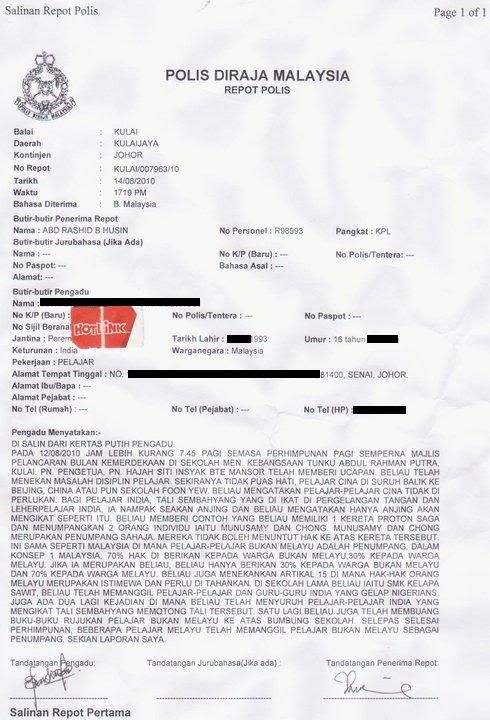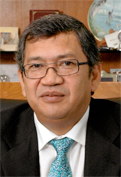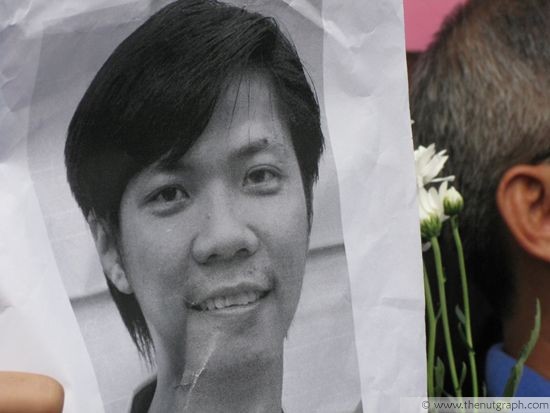KUALA LUMPUR, Aug 16 – An all-out war appears to have broken out between Barisan Nasional allies MCA and Umno, with Datuk Seri Dr Chua Soi Lek accusing “some BN leaders” of failing to recognise past failures and claiming that they would eventually cause the MCA’s demise.
The MCA president said that the party was not afraid to side with its opposition foe DAP in issues that benefited the community and would not run away from making its stand known.
Dr Chua also indirectly named Datuk Seri Hishammuddin Hussein as one of the BN leaders he was referring to, claiming that this was shown in the Umno vice-president’s blunt reminder to the MCA yesterday to stick with BN’s struggles.
“Hishammuddin’s statement yesterday that the MCA should not forget the struggle of the BN when fighting for Chinese demands shows that some BN leaders have yet to learn from the 2008 general election and do not understand the urge of the people to reform,” he said in a statement here today.
It was reported today that the Umno vice-president had “reminded MCA to stick with the struggles” of BN when championing the rights of the Chinese community.
Dr Chua said that based on the results of Elections 2008, the new MCA leadership understood the need for it to change to regain the people’s trust and support.
“If some BN leaders continue to live in their own world, they will certainly push MCA to its doom and will not bring the ruling coalition any good,” he claimed.
Dr Chua said that while the party respected Hishammuddin’s views, the latter should not blame MCA for deviating from the objectives and struggles of the BN.
“He cannot blame us for deviating from the objectives and struggles of the BN simply because MCA has a different voice from him or other component party leaders,” he said.
Dr Chua defended the new, stronger stance of the present MCA leadership under his presidency, claiming that the party’s political struggle was “totally reasonable and legal”.
“MCA will push hard for the implementation of the 13 resolutions passed during the Chinese Economic Congress held on Saturday because the resolutions are not only related to the Chinese community but also the future of the country’s economic development.
“MCA reckons that it has the responsibility to reflect the wishes of the Chinese community due to globalisation. Otherwise, not only MCA will lose the community’s support, it will not be able to also justify its political existence,” he said.
On Saturday, the MCA’s Chinese Economic Congress called for economic liberalisation and that a merit-based and needs-based system would contribute to the path for Malaysia to be globally competitive.
Dr Chua’s strong words of rebuke against Hishammuddin today continues to fan the fires already brewing between the Umno and MCA.
The tension began when MCA called on Hishammuddin to use his authority to rescind the ban on the non-Muslims’ use of the word Allah.
The Home Minister had earlier admitted that the decision was regrettable.
MCA’s call was resounded by the DAP, triggering a knee-jerk response from Deputy Prime Minister Tan Sri Muhyiddin Yassin who then called for a gag order on the issue.
The Umno deputy president had called on the MCA to accept the government’s decision in banning the word “Allah” and had also questioned MCA’s intention in sharing the same view as the DAP.
Shortly after the row quietened, Dr Chua created waves in the media again when he appeared to criticise both Umno and PAS for using religion to compete for Malay support.
He claimed that in recent days, Umno had appeared to be more “conservative” in its attempt to use religion to woo voters, and even said that the competition between the two Malay-based parties had led to some “non-progressive policies”.
The policies, he noted, had caused the country to be caught in a middle-income trap for more than 10 years.
Dr Chua in turn received flak from Umno leaders who accused him of trying to shift racial politics into religious politics.
Dr Chua and other MCA leaders have since claimed that his statement had been taken out of context.
The MCA president said that the party was not afraid to side with its opposition foe DAP in issues that benefited the community and would not run away from making its stand known.
Dr Chua also indirectly named Datuk Seri Hishammuddin Hussein as one of the BN leaders he was referring to, claiming that this was shown in the Umno vice-president’s blunt reminder to the MCA yesterday to stick with BN’s struggles.
“Hishammuddin’s statement yesterday that the MCA should not forget the struggle of the BN when fighting for Chinese demands shows that some BN leaders have yet to learn from the 2008 general election and do not understand the urge of the people to reform,” he said in a statement here today.
It was reported today that the Umno vice-president had “reminded MCA to stick with the struggles” of BN when championing the rights of the Chinese community.
Dr Chua said that based on the results of Elections 2008, the new MCA leadership understood the need for it to change to regain the people’s trust and support.
“If some BN leaders continue to live in their own world, they will certainly push MCA to its doom and will not bring the ruling coalition any good,” he claimed.
Dr Chua said that while the party respected Hishammuddin’s views, the latter should not blame MCA for deviating from the objectives and struggles of the BN.
“He cannot blame us for deviating from the objectives and struggles of the BN simply because MCA has a different voice from him or other component party leaders,” he said.
Dr Chua defended the new, stronger stance of the present MCA leadership under his presidency, claiming that the party’s political struggle was “totally reasonable and legal”.
“MCA will push hard for the implementation of the 13 resolutions passed during the Chinese Economic Congress held on Saturday because the resolutions are not only related to the Chinese community but also the future of the country’s economic development.
“MCA reckons that it has the responsibility to reflect the wishes of the Chinese community due to globalisation. Otherwise, not only MCA will lose the community’s support, it will not be able to also justify its political existence,” he said.
On Saturday, the MCA’s Chinese Economic Congress called for economic liberalisation and that a merit-based and needs-based system would contribute to the path for Malaysia to be globally competitive.
Dr Chua’s strong words of rebuke against Hishammuddin today continues to fan the fires already brewing between the Umno and MCA.
The tension began when MCA called on Hishammuddin to use his authority to rescind the ban on the non-Muslims’ use of the word Allah.
The Home Minister had earlier admitted that the decision was regrettable.
MCA’s call was resounded by the DAP, triggering a knee-jerk response from Deputy Prime Minister Tan Sri Muhyiddin Yassin who then called for a gag order on the issue.
The Umno deputy president had called on the MCA to accept the government’s decision in banning the word “Allah” and had also questioned MCA’s intention in sharing the same view as the DAP.
Shortly after the row quietened, Dr Chua created waves in the media again when he appeared to criticise both Umno and PAS for using religion to compete for Malay support.
He claimed that in recent days, Umno had appeared to be more “conservative” in its attempt to use religion to woo voters, and even said that the competition between the two Malay-based parties had led to some “non-progressive policies”.
The policies, he noted, had caused the country to be caught in a middle-income trap for more than 10 years.
Dr Chua in turn received flak from Umno leaders who accused him of trying to shift racial politics into religious politics.
Dr Chua and other MCA leaders have since claimed that his statement had been taken out of context.



 DAP national vice-chief M Kulasegaran (left) claims the Indian community, that represents under 10 percent of the country's total population, faces the highest rate of social problems when compared to the other communities.
DAP national vice-chief M Kulasegaran (left) claims the Indian community, that represents under 10 percent of the country's total population, faces the highest rate of social problems when compared to the other communities. “If MIC had only been effective in fighting for the rights of Indians, the Indians would not have been so marginalised with so many problems unresolved,” said the DAP leader angrily.
“If MIC had only been effective in fighting for the rights of Indians, the Indians would not have been so marginalised with so many problems unresolved,” said the DAP leader angrily. The fiery
The fiery 
 “We had a very formal but cordial two-hour meeting with Mohd Azmin Hassan, the director of births, deaths and adoptions,” said Penang-based Hindraf advisor and industrialist N Ganesan (left) in a telephone call to Malaysiakini yesterday. “Initially, the director-general and his deputy agreed to be present.”
“We had a very formal but cordial two-hour meeting with Mohd Azmin Hassan, the director of births, deaths and adoptions,” said Penang-based Hindraf advisor and industrialist N Ganesan (left) in a telephone call to Malaysiakini yesterday. “Initially, the director-general and his deputy agreed to be present.” The NRD disclosed that they in fact conducted 84 campaigns throughout the peninsula alone in recent months, apparently seeking out those without Malaysian personal documents “and only 80 people turned up”.
The NRD disclosed that they in fact conducted 84 campaigns throughout the peninsula alone in recent months, apparently seeking out those without Malaysian personal documents “and only 80 people turned up”. Ganesan and the other four members in his delegation explained the importance of the NRD shedding its old mindset and adopting a paradigm shift above race, religion and other considerations like the “numbers game”, among others.
Ganesan and the other four members in his delegation explained the importance of the NRD shedding its old mindset and adopting a paradigm shift above race, religion and other considerations like the “numbers game”, among others.  Ganesan thinks that the existing approach of hurling a stack of documents at would-be applicants and expecting them to decipher them and solve the problem on their own would not work.
Ganesan thinks that the existing approach of hurling a stack of documents at would-be applicants and expecting them to decipher them and solve the problem on their own would not work. 

 By Zefry Dahalan - Free Malaysia Today
By Zefry Dahalan - Free Malaysia Today
 Maimunah, the manager of a souvenir shop at Dataran Teluk Kemang, also said business had been especially bad in the past year. She blamed the Port Dickson Municipal Council, which early this year demolished shops at Batu 1, forcing the traders there to relocate at Dataran Teluk Kemang. Many of them sell goods that are similar to Maimunah’s merchandise.
Maimunah, the manager of a souvenir shop at Dataran Teluk Kemang, also said business had been especially bad in the past year. She blamed the Port Dickson Municipal Council, which early this year demolished shops at Batu 1, forcing the traders there to relocate at Dataran Teluk Kemang. Many of them sell goods that are similar to Maimunah’s merchandise.
 Abdul Shukor Maarofe of Kajang, who was holidaying with his family of six, said he did not expect the toilet situation to be so bad.
Abdul Shukor Maarofe of Kajang, who was holidaying with his family of six, said he did not expect the toilet situation to be so bad.
 Nurulikhma's friend, Norhamizah Munira Azhari, said most of the tourists were from outside Negeri Sembilan.
Nurulikhma's friend, Norhamizah Munira Azhari, said most of the tourists were from outside Negeri Sembilan.


 By Stanley Koh - Free Malaysia Today,
By Stanley Koh - Free Malaysia Today, In the last few decades, there has been a keen interest among scientists as well as professional and amateur ghost hunters to learn more about the phenomenon. Many of them are ironically disbelievers. They have hunted far and wide for ghost stories and have documented hundreds of thousands of them.
In the last few decades, there has been a keen interest among scientists as well as professional and amateur ghost hunters to learn more about the phenomenon. Many of them are ironically disbelievers. They have hunted far and wide for ghost stories and have documented hundreds of thousands of them.






 Wee adds that CPC requirements giving arrested persons the right to see their lawyers are also frequently not complied with. “The police just don’t respect it,” he says. “They do allow us to see our clients sometimes, but it’s often done grudgingly and with limits. It feels like we’re asking for favours to see our clients.”
Wee adds that CPC requirements giving arrested persons the right to see their lawyers are also frequently not complied with. “The police just don’t respect it,” he says. “They do allow us to see our clients sometimes, but it’s often done grudgingly and with limits. It feels like we’re asking for favours to see our clients.”